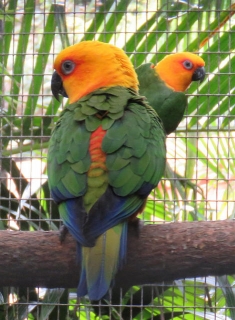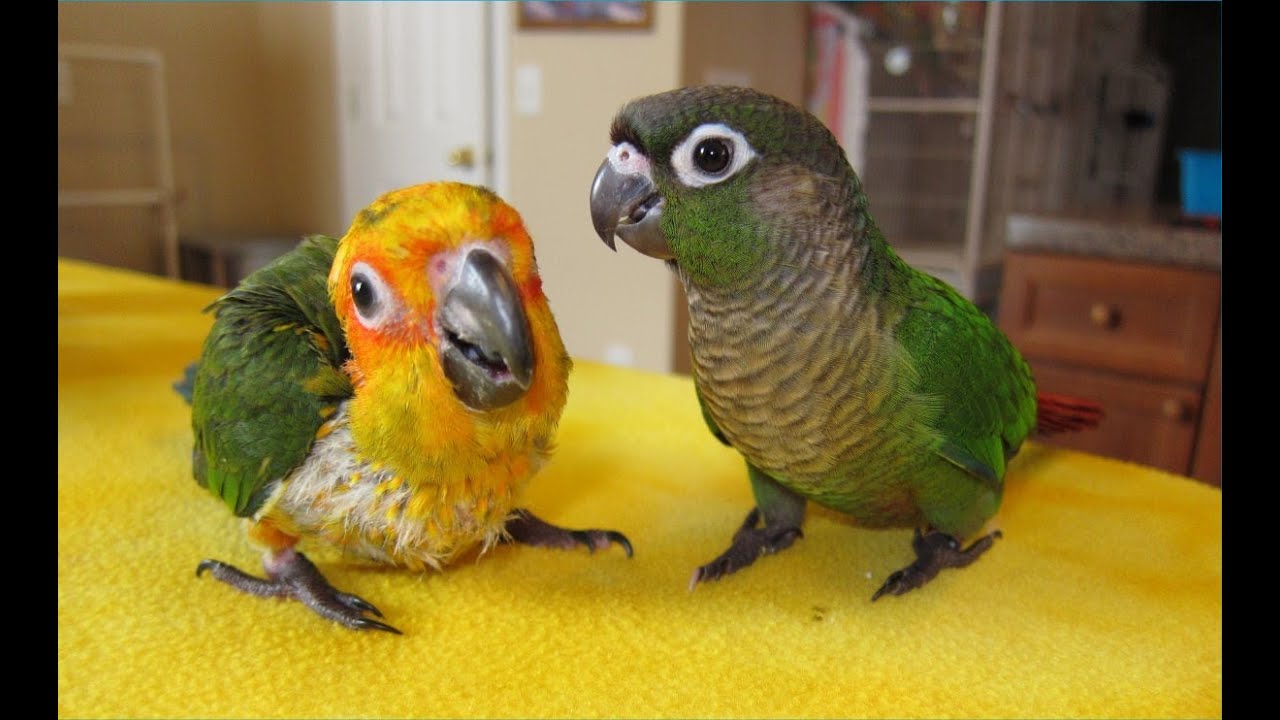Key Takeaways
- Jenday Conures are smaller parrots, about 12 inches long, with vibrant green wings and yellow heads.
- Adopting a Jenday Conure typically costs around $400 to $600, not including accessories and supplies.
- They are known for their playful and active nature but can be quite noisy at times.
- Jenday Conures can live up to 30 years with proper care, making them a long-term commitment.
- They require a spacious cage, a balanced diet, and plenty of social interaction to thrive.
Jenday Conure Adoption Guide
When considering adopting a Jenday Conure, it’s crucial to understand what makes these birds unique. Known scientifically as Aratinga jandaya, these birds are not just colorful companions but also intelligent and social creatures that can bring joy to your home. However, they come with specific needs that require careful consideration before making a commitment.

“Jandaya Conure (Aratinga jandaya …” from www.parrots.org and used with no modifications.
Understanding Jenday Conures and Jandaya Parakeets
The Jenday Conure, also referred to as the Jandaya Parakeet, is native to the woodlands of northeastern Brazil. These birds thrive in flocks, which highlights their social nature. In captivity, they require interaction and mental stimulation to stay happy and healthy. They are often compared to their close relatives, the Sun Conure, due to their similar size and bright coloration.
Identifying Physical Characteristics
One of the most striking features of the Jenday Conure is its vibrant plumage. They sport a bright yellow head and neck, with a vivid green body and blue-tipped wings. This colorful appearance makes them highly desirable among bird enthusiasts. The tail feathers are long and tapering, adding to their graceful appearance.
It’s important to note that Jenday Conures are monomorphic, meaning males and females look alike. This can make it challenging to determine their sex without professional testing. However, this doesn’t impact their suitability as pets, as both genders exhibit similar behaviors and characteristics.
Besides their visual appeal, Jenday Conures are also known for their playful demeanor. They enjoy climbing, exploring, and interacting with their environment. Therefore, providing them with toys and activities is essential for their mental and physical well-being. If you’re considering other pets with similar playful traits, you might be interested in learning about the Basenji dog, known for its unique characteristics.
- Bright yellow head and neck
- Green body with blue-tipped wings
- Long, tapering tail feathers
- Monomorphic appearance
Comparison to Other Conures
While Jenday Conures share similarities with other conures, such as the Sun Conure and Green-Cheeked Conure, they have distinct differences. For example, Jenday Conures are slightly larger than Green-Cheeked Conures but similar in size to Sun Conures. In terms of personality, Jendays are known for being affectionate and sociable, but they can also be quite vocal.
“The Jenday Conure is a colorful, affectionate, and social bird that requires plenty of interaction and stimulation to thrive.”
When comparing their noise levels, Jenday Conures can be loud, similar to Sun Conures, which is an important factor to consider if you live in an apartment or have noise-sensitive neighbors. However, their vibrant personalities and affectionate nature often outweigh this potential downside for many bird lovers.
Cost and Size Considerations
Adopting a Jenday Conure involves several costs beyond the initial purchase price. Understanding these expenses is vital for prospective owners to ensure they can provide the best care for their new feathered friend.
Average Adoption Price
The cost of adopting a Jenday Conure can range from $400 to $600. This price can vary based on factors such as the bird’s age, health, and the breeder’s reputation. It’s important to choose a reputable breeder or adoption center to ensure the bird has been well-cared for and is healthy.
Besides the adoption fee, you’ll need to budget for additional expenses, such as a suitable cage, toys, food, and regular veterinary check-ups. These initial and ongoing costs are necessary to maintain your conure’s health and happiness.
Size and Housing Needs
Despite their small size, Jenday Conures are highly active birds that require ample space to move around. A cage that is at least 24 inches wide, 24 inches deep, and 30 inches high is recommended. The cage should also be equipped with perches, toys, and climbing structures to keep your conure entertained and engaged.
It’s also essential to provide a safe environment outside the cage for supervised playtime. This allows your Jenday Conure to stretch its wings and explore, which is crucial for its physical and mental well-being.
Rarity and Availability
Finding a Jenday Conure for adoption can sometimes be challenging due to their popularity and limited availability. However, with patience and research, you can locate a reputable source for your future pet.
Where to Find Jenday Conures
To adopt a Jenday Conure, start by checking local bird adoption centers, aviaries, or reputable breeders. Online bird forums and communities can also be valuable resources for finding available birds and connecting with experienced owners who can offer advice and support. For those interested in adopting other exotic birds, you might find the Crimson Rosella adoption guide helpful as well.
Challenges in Adoption
Adopting a Jenday Conure requires careful consideration and preparation. These birds are long-lived, with a lifespan of up to 30 years, so it’s important to be ready for a long-term commitment. Additionally, their social nature means they need plenty of interaction and attention, which can be challenging for busy households.
Most importantly, consider the noise level of Jenday Conures, as their vocalizations can be quite loud and frequent. Ensuring your living situation can accommodate this is crucial for a harmonious relationship with your new pet.
Temperament and Noise Levels
Jenday Conures are known for their lively and affectionate personalities. They thrive on social interaction and enjoy being part of the family. However, their vocal nature can be a double-edged sword, providing both entertainment and challenges.
Typical Behavior Traits
Jenday Conures are lively and curious birds, always eager to explore their surroundings. They are known for their playful antics, often swinging from toys or climbing around their cages. This playful nature requires owners to provide a variety of toys and activities to keep them entertained. Furthermore, they are highly social creatures and love to interact with their human companions, often forming strong bonds with them. If you are interested in learning more about other friendly pet birds, you might want to check out the Crimson Rosella.
Managing Noise in Different Environments
One of the most common concerns with Jenday Conures is their noise level. They are vocal birds and can produce loud, high-pitched calls. While this can be endearing, it may not be suitable for all living environments, particularly apartments or homes with noise-sensitive neighbors.
“Jenday Conures can be loud, but their vibrant personality and affectionate nature often make up for the noise.”
To manage noise, it is important to provide your conure with plenty of mental stimulation and social interaction. Boredom can lead to increased vocalizations, so ensure your bird has a variety of toys and regular out-of-cage time. Additionally, establishing a routine can help your conure feel secure and reduce excessive noise.
For those in noise-sensitive environments, consider soundproofing options or choosing a different bird species with a quieter disposition.
Talking Abilities and Training
Jenday Conures, like many conures, have the potential to mimic human speech, although they are not known for their talking abilities. Instead, they excel at learning tricks and commands, making them entertaining companions. Training can be a fun and rewarding experience for both you and your bird.
- Start training with simple commands like “step up” or “wave.”
- Use positive reinforcement, such as treats or praise, to encourage desired behaviors.
- Keep training sessions short and engaging to maintain your bird’s interest.
With patience and consistency, you can teach your Jenday Conure a variety of tricks and commands, enhancing your bond and providing mental stimulation for your bird.
What to Expect in Communication
While Jenday Conures may not have an extensive vocabulary, they communicate in other ways. They use a range of vocalizations, body language, and behaviors to express themselves. Understanding these cues can help you better meet your bird’s needs and strengthen your relationship.
For example, a conure may fluff its feathers or bob its head when excited or seeking attention. Learning to interpret these signals can make you a more responsive and attentive owner.
Basic Training Tips
Training your Jenday Conure can be a rewarding experience that enhances your bond and provides mental stimulation for your bird. Here are some tips to get started:
- Begin with basic commands such as “step up” or “stay.”
- Use treats or verbal praise as positive reinforcement.
- Keep training sessions short, around 5-10 minutes, to maintain your bird’s interest.
- Be patient and consistent, as learning takes time.
Training is not only about teaching tricks but also about building trust and communication with your bird. With time and dedication, your Jenday Conure can become a well-behaved and delightful companion.
Bonding and Pet Compatibility
Building a strong bond with your Jenday Conure is essential for a fulfilling pet-owner relationship. These birds thrive on social interaction and require attention to remain happy and healthy.
Ensuring a Strong Bond
To develop a strong bond with your Jenday Conure, spend quality time with them daily. Engage in activities like playing, training, and simply talking to your bird. They enjoy being part of the family and will often seek out attention from their human companions.
Providing a consistent routine can also help strengthen your bond. Birds thrive on predictability, so try to maintain regular feeding, play, and training times. This consistency will help your conure feel secure and deepen your relationship.
Additionally, be patient and gentle in your interactions. Building trust takes time, but with consistent care and attention, your conure will become a loving and loyal companion.
- Spend daily quality time with your bird.
- Engage in interactive activities and training.
- Maintain a consistent routine for feeding and playtime.
- Be patient and gentle to build trust.
Compatibility With Other Birds
Jenday Conures can coexist with other birds, but it’s essential to introduce them carefully and monitor their interactions. While they are social creatures, they may not always get along with every bird, especially if there is a significant size difference or if the other bird is more aggressive. For more detailed information, check out this Jenday Conure guide.
If you plan to introduce a Jenday Conure to other birds, start by allowing them to see each other from separate cages. Gradually increase their interaction time under supervision to ensure they get along. Always provide separate spaces for each bird to retreat to if needed.

“Green Cheek, Jenday and Sunday Conures …” from www.youtube.com and used with no modifications.
Comparative Overview: Jenday Conure vs. Other Birds
Understanding how Jenday Conures compare to other popular bird species can help you make an informed decision when choosing a pet bird. Each species has unique characteristics that may suit different lifestyles and preferences. For example, the Crimson Rosella is known for its vibrant colors and friendly nature, offering a different experience for bird enthusiasts.
Jenday vs. Umbrella Cockatoo
Umbrella Cockatoos are much larger than Jenday Conures, with an average length of 18 inches compared to the Jenday’s 12 inches. They are known for their affectionate nature and strong bonds with their owners, similar to Jenday Conures. However, Umbrella Cockatoos require more space, care, and attention due to their size and complex social needs.
In terms of noise, both species can be loud, but Umbrella Cockatoos are generally considered more vocal. Therefore, they may not be suitable for noise-sensitive environments. Additionally, Umbrella Cockatoos can be more demanding in terms of time and commitment, making them better suited for experienced bird owners.
Jenday vs. Green-Cheeked Conure
Green-Cheeked Conures are slightly smaller than Jenday Conures, typically measuring around 10 inches in length. They are known for their playful and affectionate nature, similar to Jendays, but are generally quieter, making them a better option for those concerned about noise. For more information on choosing the best pet, check out our guide on best rabbit types to adopt.
While both species require social interaction and mental stimulation, Green-Cheeked Conures may be easier to manage in terms of noise levels. However, their quieter disposition doesn’t mean they lack personality. They are just as capable of forming strong bonds and learning tricks as their louder counterparts.
Jenday vs. Sun Conure
Jenday Conures and Sun Conures are often compared due to their similar size and vibrant coloration. Both species measure around 12 inches in length and are known for their striking yellow and green plumage. However, there are distinct differences in their behavior and care requirements that potential owners should consider, especially when comparing them to other pets like the Dwarf Papillon Rabbit.
In terms of temperament, both birds are affectionate and enjoy social interaction. However, Sun Conures are often considered more playful and energetic, while Jenday Conures are slightly more reserved but still very social. This difference can affect the level of interaction and playtime each bird requires, similar to how different dog breeds vary in temperament.
When it comes to noise, both Jenday and Sun Conures can be loud, but Sun Conures are generally considered even more vocal. This can be a crucial factor for those living in apartments or noise-sensitive areas. Therefore, if noise is a concern, a Jenday Conure might be a more suitable choice.
Both species require similar care in terms of diet, housing, and social interaction. However, the Sun Conure’s higher energy levels may require more extensive playtime and enrichment activities to keep them satisfied and healthy.
- Both species are around 12 inches long with vibrant colors.
- Sun Conures are generally more energetic and vocal.
- Jenday Conures are slightly more reserved but still social.
- Both require similar care but with varying levels of interaction.
Comprehensive Care Guide
Providing proper care for your Jenday Conure is essential to ensure a long, healthy, and happy life. These birds are active and social, requiring a balanced diet, ample space, and regular interaction with their human companions. If you’re interested in understanding the care requirements for other pets, you might find this guide on adopting different rabbit types insightful.
First and foremost, a suitable cage is necessary. The cage should be spacious, allowing your conure to move freely and exercise. Additionally, it should be equipped with various perches, toys, and climbing structures to provide mental and physical stimulation.
Diet is another critical aspect of care. Jenday Conures require a balanced diet consisting of high-quality pellets, fresh fruits, and vegetables. Offering a variety of foods ensures they receive the necessary nutrients for optimal health.
- Provide a spacious cage with perches and toys.
- Feed a balanced diet of pellets, fruits, and vegetables.
- Ensure daily social interaction and playtime.
- Schedule regular veterinary check-ups.
Regular social interaction is vital for Jenday Conures. These birds thrive on companionship and can become lonely or bored without it. Therefore, spending time with your conure daily through play, training, or simply talking to them is crucial for their well-being.
Daily Care Requirements
Caring for a Jenday Conure involves daily tasks to maintain their health and happiness. These include feeding, cleaning, and social interaction.
Start each day by providing fresh food and water. Clean the cage regularly to ensure a hygienic environment, removing any leftover food or droppings. This prevents the spread of bacteria and keeps your bird healthy.
Creating an Enriching Environment
Jenday Conures are intelligent birds that require mental stimulation to prevent boredom and associated behavioral issues. Providing a variety of toys, such as puzzles, swings, and chewable items, is essential to keep them engaged. For those interested in other pet bird options, consider learning about the Crimson Rosella, another fascinating species.
Rotate toys regularly to maintain their interest and encourage exploration. Additionally, consider setting up a play area outside the cage for supervised free-flight time. This allows your conure to exercise and explore in a safe environment.
Enrichment activities, such as foraging games or training sessions, can also provide mental stimulation and strengthen your bond with your bird. Remember, a happy conure is a healthy conure.
Ideal for First-Time Bird Owners?
Jenday Conures can be suitable for first-time bird owners, provided they are prepared for the commitment and responsibilities involved. These birds are social and affectionate, making them rewarding companions for those willing to invest time and effort into their care.
However, it’s important to consider the potential challenges, such as their noise level and need for social interaction. Prospective owners should assess their living situation and lifestyle to ensure they can meet the needs of a Jenday Conure.
Pros and Cons to Consider
Before adopting a Jenday Conure, weigh the pros and cons to determine if they are the right pet for you:
- Pros: Affectionate and social, long lifespan, vibrant colors, capable of learning tricks.
- Cons: Can be noisy, require daily interaction, long-term commitment, may not be suitable for apartments.
Frequently Asked Questions
To help prospective Jenday Conure owners, here are answers to some common questions about these delightful birds. For more detailed information, you can visit this Jenday Conure guide.
How long do Jenday Conures live?
Jenday Conures have a long lifespan, typically living up to 30 years with proper care. This longevity makes them a long-term commitment for any owner, so it’s important to be prepared for the years of companionship they offer.
Ensuring a healthy diet, regular veterinary care, and a stimulating environment can contribute to a long and happy life for your conure.
What should I feed my Jenday Conure?
A balanced diet is essential for the health of your Jenday Conure. High-quality pellets should form the basis of their diet, supplemented with fresh fruits and vegetables. Offering a variety of foods ensures they receive the necessary nutrients for optimal health.
Some suitable fruits and vegetables include apples, carrots, spinach, and berries. Avoid feeding your conure avocado, chocolate, or caffeine, as these can be toxic to birds. For more information on bird diets, you can explore the Crimson Rosella’s dietary needs.
Can Jenday Conures be left alone during the day?
Jenday Conures are social birds that thrive on interaction, so they may not do well if left alone for extended periods. If you have a busy schedule, consider adopting a pair of conures to keep each other company or ensure you spend quality time with your bird when you’re home. For those interested in other pet options, you might want to explore rabbit types to adopt as they can also make great companions.
How can I reduce noise from a Jenday Conure?
To manage noise levels, provide your conure with plenty of mental stimulation and social interaction. Boredom can lead to increased vocalizations, so ensure your bird has a variety of toys and regular out-of-cage time.
Establishing a routine can also help your conure feel secure and reduce excessive noise. If noise remains a concern, consider soundproofing options or choosing a quieter bird species.
“Providing mental stimulation and social interaction can help reduce noise levels in Jenday Conures.”
Overall, Jenday Conures are affectionate and lively birds that can make wonderful companions for those willing to invest time and effort into their care. With proper attention, diet, and environment, these vibrant birds can thrive and bring joy to your home for many years. For more detailed information, you can refer to this Jenday Conure guide.


